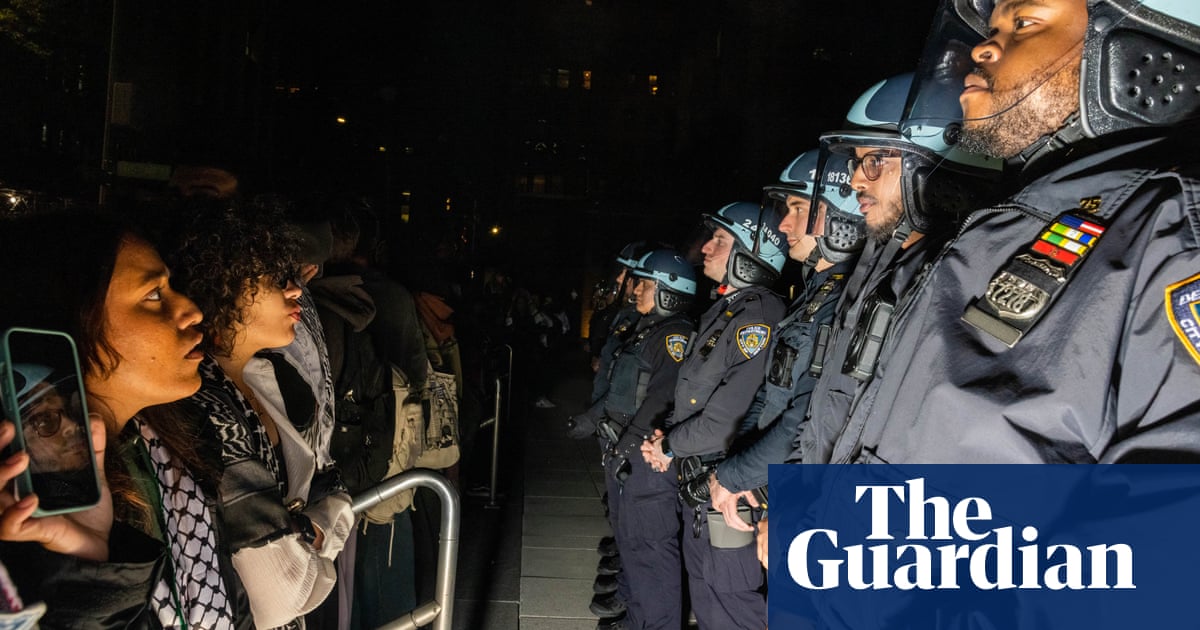
Police arrested around 150 protesters at pro-Palestinian demonstrations at Yale and New York University on Monday night, while Columbia University announced that classes would be taught remotely for the rest of the semester, as anger boiled over on leading US campuses.
On the Yale University campus in New Haven, Connecticut, authorities arrested at least 47 protesters on Monday evening, the university said in a statement. Students who were arrested will be referred for disciplinary action.
Several hundred people had been protesting on the Yale university campus, including hunger strikers, demanding the university divest from military weapons manufacturers and other companies with ties to Israel. Yale said it had repeatedly asked students to leave, and warned them they could face law enforcement and disciplinary action if they did not.
And in downtown Manhattan, police clashed with protesters at New York University. There were reports of officers using pepper spray as demonstrators tried to block a police bus from leaving the scene with detained students, and more than 100 people were arrested.
Officers moved on an encampment near the university shortly after nightfall. There, too, hundreds of demonstrators had defied university warnings that they faced consequences if they failed to vacate the plaza.
Video on social media showed police taking down tents in the protesters’ encampment in a tense and at times chaotic scene. Some officers tossed tents, and others grappled with demonstrators.
Protesters tussled with officers and chanted: “We will not stop, we will not rest. Disclose. Divest.”
A New York police spokesperson said arrests were made after the university asked police to enforce trespassing violations but the total number of arrests and citations would remain unknown until much later.
The police crackdowns came after Columbia University witnessed a huge walkout by faculty on Monday in solidarity with students who were arrested last week after setting up a camp protest, with demands for the elite institution to divest from companies tied to Israel.
Bassam Khawaja, a lecturer at Columbia law school and supervising attorney at the school’s human rights clinic, told the Guardian he was “shocked and appalled that the president went immediately to the New York police department”.
“This was by all accounts, a non-violent protest,” he said. “It was a group of students camping out on the lawn in the middle of campus. It’s not any different from everyday life on campus.”
After the crackdown at Columbia, students across the US launched their own protests in solidarity, many of them calling for their universities to back a ceasefire in Gaza and divest from companies with ties to Israel.
Students at Brown, Princeton and Northwestern held protests on Friday and over the weekend.
Students at the Massachusetts Institute of Technology and Emerson College, both in the Boston area, have started their own protest encampments.
Other institutions that saw protest actions included Boston University, the University of California, Berkeley, and the University of North Carolina at Chapel Hill.
Robert Kraft, a major donor to Columbia University and the owner of the Patriots NFL football team who funded the Kraft Center for Jewish Student Life at Columbia, on Monday announced he would pull his support “until corrective action is taken” on campus.
Amid a diversity of views on the New York campus of Columbia, some Jewish students have joined the pro-Palestinian protests, others are staying away and some have said they feel unsafe.
The Columbia University president, Nemat Minouche Shafik, called in New York police last week to clear a tent encampment on its main lawn of students demanding the university divest from companies with ties to Israel.
She has come under fire both for not cracking down on the growing protests and for the manner in which she cracked down, by calling in the city’s police department to arrest students. She is facing calls to resign from some members of Congress, mainly Republican but also Democratic.